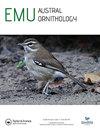Mitigation of seabird bycatch in New Zealand squid trawl fisheries provides hope for ongoing solutions
IF 1.1
4区 生物学
Q3 ORNITHOLOGY
引用次数: 0
Abstract
ABSTRACT Although there is an increasing awareness of the high rates of seabird bycatch in trawl fisheries globally, there is relatively limited implementation of effective mitigation measures. Seabirds that are attracted to the stern of the trawl vessel to feed on fish-waste can be drowned or injured when they collide with warps/cables or when they become entangled in nets. Managing fish-waste discharge (processing offal and discards) and limiting access to it by scaring birds have been identified as the most effective measures to reduce seabird mortality from collisions with warps. New Zealand’s arrow squid (Nototodarus spp.) trawl fishery occurs during the austral summer and autumn when there is significant overlap with large numbers of foraging seabirds due to the proximity of breeding areas. Regulations introduced by the New Zealand government in 2007 requiring the use of devices to reduce warp strikes and operational procedures to manage fish-waste were independently implemented by the fishing industry in 2007 with the support of fishery regulators. The rate of capture of albatrosses by warps decreased from a mean of 2.9 birds per 100 tows during the period 2003 to 2006 to a mean of 0.7 birds per 100 tows after 2007. Long-term ownership of squid fishery quota catalysed the proactive engagement of the industry and has been reflected in a positive cultural shift in the attitude of fishers towards managing the risk of the capture of seabirds. Multi-sector collaboration and engagement allowed for the translation of experimental mitigation results into long-term, industrial-scale operational practices.在新西兰鱿鱼拖网渔业中,减少海鸟附带捕获为持续的解决方案提供了希望
尽管人们越来越意识到全球拖网渔业中海鸟副渔获率很高,但有效缓解措施的实施相对有限。海鸟被吸引到拖网船的尾部以鱼粪为食,当它们与经线/电缆相撞或被网缠住时,可能会被淹死或受伤。管理鱼类废物排放(处理内脏和丢弃物)和通过吓唬鸟类来限制接触这些废物已被确定为减少海鸟因与扭曲物碰撞而死亡的最有效措施。新西兰的箭乌贼(Nototodarus spp.)拖网渔业发生在南部的夏秋两季,由于靠近繁殖区,这段时间与大量觅食的海鸟有明显的重叠。新西兰政府于2007年出台的法规要求使用设备减少翘曲冲击,并在渔业监管机构的支持下,于2007年由渔业独立实施了管理鱼类废物的操作程序。信天翁的捕鸟率从2003年至2006年的平均每100拖2.9只下降到2007年以后的平均每100拖0.7只。鱿鱼渔业配额的长期所有权促进了该行业的积极参与,并反映在渔民对管理捕获海鸟风险的态度的积极文化转变中。多部门协作和参与有助于将实验性缓解结果转化为长期的工业规模业务实践。
本文章由计算机程序翻译,如有差异,请以英文原文为准。
求助全文
约1分钟内获得全文
求助全文
来源期刊

Emu-Austral Ornithology
生物-鸟类学
CiteScore
2.00
自引率
7.70%
发文量
33
审稿时长
>12 weeks
期刊介绍:
Emu – Austral Ornithology is the premier journal for ornithological research and reviews related to the Southern Hemisphere and adjacent tropics. The journal has a long and proud tradition of publishing articles on many aspects of the biology of birds, particularly their conservation and management.
 求助内容:
求助内容: 应助结果提醒方式:
应助结果提醒方式:


